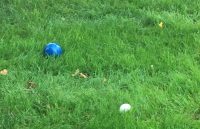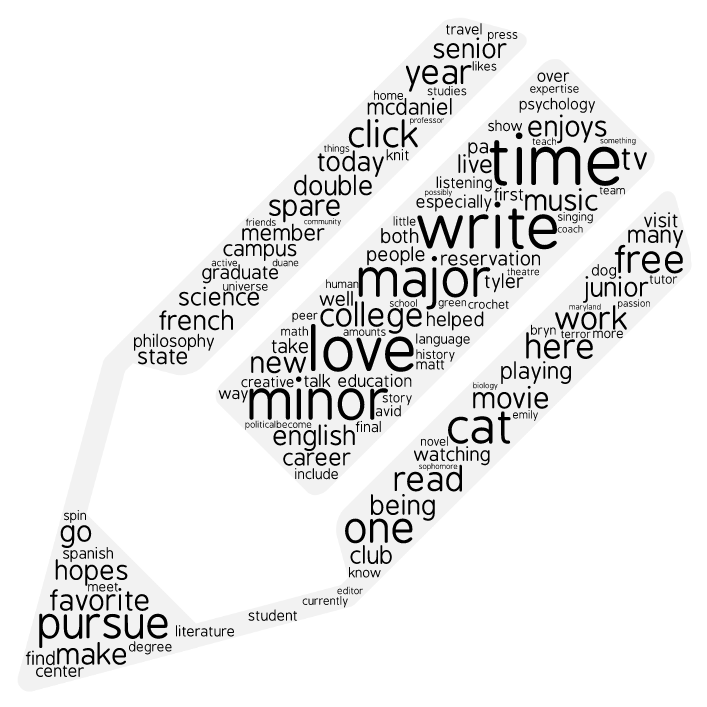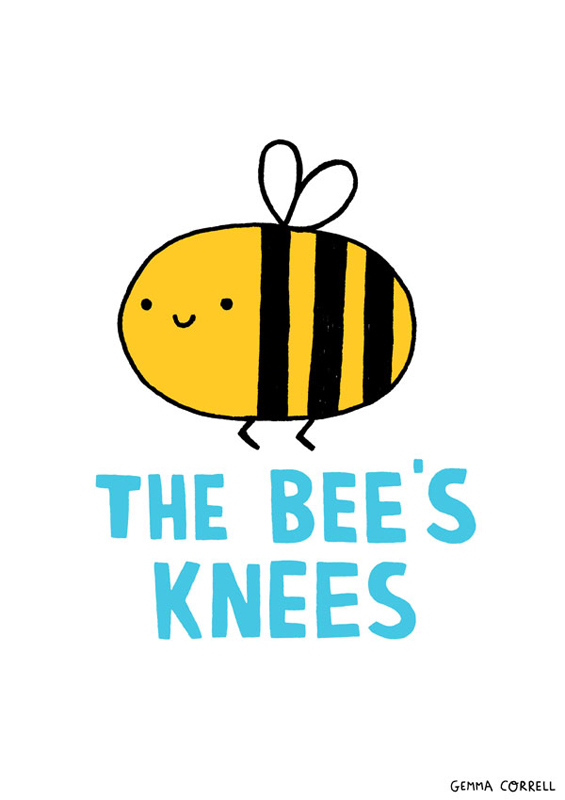McDaniel students should apply to be Writing Tutors frankly because being a tutor is a wonderful opportunity that our college offers. Below I’ve listed the reasons why I believe, as a current tutor, other students should apply for the position:
- Being a good writer requires practice like any other skill. As a writing tutor, you help others to practice this skill which in turn betters your own writing skills.
- You have the opportunity to work in one of the most diverse settings on campus. This can be very attractive on a resume.
- Interacting with your peers in a one-on-one tutoring session helps to develop interpersonal skills. Tutors have to be mindful of their tutee’s emotions during a tutoring session. This skill is also very attractive on a resume.
- You have the opportunity to work with the Director on professional development tasks. Tutors can develop skills such as communication, organization, and team leadership.
- You get to meet different people and you make new friends with your fellow tutors and your tutees!
- Your hours are flexible with your schedule. Generally, you do not work more than the number of hours that you ask for.
- You have the opportunity to achieve certification through the Association for the Coaching and Tutoring Profession. This certification is paid for by the Writing Center. All tutors have to achieve the title of Associate Peer Tutor, but students can elect to further their level of certification by taking more advanced training courses.
 I’ll confess … I love lawn games. Badminton, croquet, horseshoes … and most importantly BOCCE! So selfishly, I organized a Writing Center bocce night. None of the tutors even knew what bocce was before this event, but they’re generally good sports and go along with my crazy ideas. So Kaylan, Marya, and I grabbed the bocce set (full disclosure: Marya carried it for me) and headed out to Red Square. I was worried that no students would want to join us, but when we got out there, a small crowd was waiting for us! Hooray McDaniel students! Eventually, Michael and Mikayla joined us, and we even met Jake Fine, who is running for sophomore Homecoming King. I have no idea about the other candidates, but he seems like #AFineChoice.
I’ll confess … I love lawn games. Badminton, croquet, horseshoes … and most importantly BOCCE! So selfishly, I organized a Writing Center bocce night. None of the tutors even knew what bocce was before this event, but they’re generally good sports and go along with my crazy ideas. So Kaylan, Marya, and I grabbed the bocce set (full disclosure: Marya carried it for me) and headed out to Red Square. I was worried that no students would want to join us, but when we got out there, a small crowd was waiting for us! Hooray McDaniel students! Eventually, Michael and Mikayla joined us, and we even met Jake Fine, who is running for sophomore Homecoming King. I have no idea about the other candidates, but he seems like #AFineChoice.

We went over the rules, and while it may not have been a “regulation” bocce court, the patch of grass by the big bell was perfect for our game. I can’t speak for anyone else, but I had a ton of fun … and I even got to meet Mikayla’s dog, Ice. He might have been a bit too excited by the pellino, but who can blame him? Bocce is awesome!
The real dark horse of the evening was Marya, who as it turns out, is a really solid bocce player. She says she’s not athletic, but the bocce court says otherwise. We also met a few McDaniel students who grew up playing bocce, so that also made me feel a lot less like a nerd for suggesting it!
We’ve got more social events planned for the rest of the semester, with more being planned all of the time. On October 2nd, we’re going to be drinking tea (or coffee) and eating cookies in the Hill Hall Lobby. And then on October 26th, we’ll be watching Goosebumps in Hill Hall 108 to celebrate Halloween (costumes are definitely encouraged).
All of us at the Writing Center are excited to get a chance to meet students outside of the typical tutoring session. So if you want to get to know the tutors, come out to our next social event and introduce yourself! We’re more than just a grammatically correct face.

Let’s be honest, most of us tell ourselves we will definitely start writing at a certain time of the day, and by the time it comes, we find ourselves sitting in front of our computer, staring at a blank Word document (almost blank! It probably has our name on it and an earlier date so it looks like we started earlier than the night before it’s due). After a while, you find yourself writing, but soon enough you are checking Instagram, or texting, or doing anything remotely entertaining to distract you from your work. Sound familiar? So how do you remain focused once you’ve started? Here are some tips!
- Find a good place to write. This may sound cheesy, but I can’t stress this enough. Find a place that’s conducive to writing for you. Some people get severely distracted in loud places, while some others can’t stand to sit in silence. Figure out what kind of person you are and find that place where you’ll be comfortable and feel like you can conquer anything.
- Accept the fact that, yes, you could be doing something more fun, but this assignment needs to get done. Many times, merely knowing that we could be relaxing instead of doing work creates writer’s block, making it impossible to concentrate. Let go of the tension that those feelings are causing and accept the assignment as it is. You’re in college now, you will get through this assignment and many more, so accept it and get to writing!
- Try not to think about how much you have left. I completely understand the feeling of dread you get when you look at how much you’ve written and it’s not even close to the page limit. Don’t get stuck! The more time you think about that, the less time you spend writing. Look at what you’ve written, give yourself a pat in the back for getting something done, and keep going!
- Give yourself breaks. Let yourself get distracted for 5-10 minutes, but stick to a schedule. Write for a while, then give yourself a break. I know turning off your phone sounds like torture, and I know the urge to check all your social media grows by the minute, but if you stick to a schedule you are more likely to get stuff done. You can even use these shorts breaks as a reward. You go, you!
- Get up! Ultimately, if your mind is wandering too much, go take a walk. Get some coffee or water, stretch your legs, and think about something else. By the time you come back to your computer, you are bound to feel recharged and have some fresh ideas.
- Visit the Writing Center! Just saying, if you come see us, you’ll have little choice but to focus on your assignment—at least for that hour.
Sometimes writing is a struggle for all of us, and that’s okay. But learning how to concentrate on your writing will help you in the long run. It may not be easy at first, but I’m sure you’ll get there. Good luck!
Mirii Rep, Writing Center Tutor
Here at the writing center, we often find ourselves working with students who are the sole authors of their papers, short stories, and other works of writing. But that’s not by design; we are fully capable of helping students with group projects, and would love to help. Here’s how.
- Step one: coordinate with your group. Figure out a collective time when you can all come to the writing center and work on your entire project. We at the Writing Center are only capable of helping any individual member with their own portion of the work. The ONLY time we can help the group on the whole project is if every member attends.
- Step two: make an appointment. In the ‘What would you like to work on’ section, make a note that you and your group members (please name them!) will be bringing in your project.
- Step three: arrive at the appointment and find a place for the tutor to help you. Depending on how many group members you have, any of the stations inside the Writing Center itself might be a bit too crowded, so feel free to ask the tutor to work with you outside in Hill Lobby.
- Step four: work. Make sure each member works with the tutor on their own portion.
- Step five: practice with the tutor present. If there’s enough time and it’s a group presentation, go ahead and practice as a group giving the presentation. It’s a good way to get feedback and smooth out any snags without the situation becoming direr.
- Step six: profit. Ask the tutor to notify the professor that you all came. Give an awesome presentation or turn in a great paper, sit back and enjoy.
-Writing tutor Kaijaii
Have you ever finished a paper and felt like you just can’t look at it any more because you’ve been staring at it for so long? Using a text editor or generator is one exciting way to get a fresh look at a paper. There are an endless number of free online programs that can help you reassess a piece that you’ve written, whether it’s a blog post, a poem, a short story, or a research paper. Two types of programs that you can run a text through, whether in its entirety or in part, are:
- Word cloud generators
- Up-goer five text editors
Each of these programs can give new perspectives on a piece of writing that may seem stagnant.
Word Cloud Generators
There are a variety of free word cloud generators available on the Internet. Some of these include Jason Davies Word Cloud Generator, Wordle, WordItOut, and Tagul. Below is an example of a world cloud created by running the text from our tutor bios through the Tagul generator. The larger a word appears, the more it has been used in the entered text. As you can see from our word cloud, the tutors are a bunch of people who have majors and minors and who love to write and to spend their time on a variety of activities (apparently our preferred pet is a cat). Because of this feature, making word clouds can be a fun way to see which words appear most frequently in your text. Perhaps you will realize you have been subconsciously using a word more than you should. Maybe you will be able to see that your text has focused more on an idea than you originally thought you would (which means you should schedule an appointment at the Writing Center to adjust your thesis statement accordingly!). Either way, using a word cloud generator is a great way to get a new look at your writing.

Up-Goer Five Editors
There are also a number of text editors that are referred to as “Up-goer Five Editors.” After copying and pasting text into these kinds of editors, they will essentially highlight or underline any words that are NOT one of the thousand most commonly used words in the English language. This seemingly absurd concept was first made popular by a group of scientists who made a comic attempting to explain the Saturn V moon rocket using only the “ten hundred” most common words – hence the name “Up-goer Five.” In this way, it can be a very useful tool for highlighting jargon. While discipline-specific terminology is wonderful to use with targeted audiences, general papers or presentations are a different case. Works that are shared with a general audience should avoid these words – or actively define them so that audience members can understand the progression of ideas. It is important to remember, however, that a limit of only the thousand most common words is a little bit overkill, so please proceed with caution (all the underlined words in the sentence were highlighted by Up-Goer Five text editor)!
— Jason Swartz, writing tutor
While I may be terribly biased towards Chicago (It’s the best! The bees’ knees! And the cat’s pajamas!), here are some helpful tips for the top 7 errors you are probably making in your first ever Chicago paper:
- Parentheticals! Watch out for these—Chicago does not use any parentheticals for in-text citations; in fact, there are NO in-text citations at all in CMS.

Image from fitisafeministissue.com
Throw these out of your writing, and adopt the latest invention: footnotes![1]
- Footnotes and the bibliographical entries are not created equal! There are some small differences between these two entries, but they are NOT the same. Read your Chicago manual carefully to determine when to use a comma or a period, and when you need all of the page numbers in the book versus the page you are quoting. (Hint: commas go in footnotes, periods in the bibliography; all of the page numbers are needed for the bibliography, but only the page you are quoting on the page itself.)
- On that note, a bibliography and a works cited are NOT the same! You only use a bibliography in CMS, and only ever use a works cited in MLA.
- Watch your Ibid! You can ONLY use Ibid if you are quoting the same text as you just quoted in your previous footnote or endnote, not one from two pages ago. If you are quoting the same text that you did ten footnotes ago, you have to rewrite your footnotes’ entry.
- Cover that paper up! In Chicago, you will ALWAYS use a cover page, just as you NEVER use a cover page in MLA. Your cover page will contain all of the same information that your title page would in MLA, just organized differently. Make sure to check your Chicago Manual (or Hacker Reference) to get the scoop on how to do it.
- Leap Day in Chicago? Just like in MLA, right? No! In Chicago, you must write out the entire date, just as if you were writing a formal letter to your grandma. Leap Day in Chicago is beautiful: February 29, 2016, while Leap Day in MLA, is well, too short: 29 Feb 2016!
- Leave the “p.” or “pages” with APA! CMS does not use any “p.” or “page” for citing a page number: simply put your number and off you go.

Image from imgur.com
Maybe I’ve converted you to Chicago, maybe not—either way, these tips will get you heading in the right direction for your first (or second, or third, or 35th) Chicago paper.
If you have any other questions on Chicago, or any other citation style and how to use it, stop by and see us in Hill 102!
-Emily, peer tutor
[1] Just like this! Find your insert button, select “footnote,” and here you are. This is where you will put your footnote, though you can also use endnotes. They are exactly the same, except for where they are placed. If you don’t like text under the pretty line at the bottom of your page, use endnotes: they make their own page at the end of your paper, right before your bibliography.
 I’ll confess … I love lawn games. Badminton, croquet, horseshoes … and most importantly BOCCE! So selfishly, I organized a Writing Center bocce night. None of the tutors even knew what bocce was before this event, but they’re generally good sports and go along with my crazy ideas. So Kaylan, Marya, and I grabbed the bocce set (full disclosure: Marya carried it for me) and headed out to Red Square. I was worried that no students would want to join us, but when we got out there, a small crowd was waiting for us! Hooray McDaniel students! Eventually, Michael and Mikayla joined us, and we even met Jake Fine, who is running for sophomore Homecoming King. I have no idea about the other candidates, but he seems like #AFineChoice.
I’ll confess … I love lawn games. Badminton, croquet, horseshoes … and most importantly BOCCE! So selfishly, I organized a Writing Center bocce night. None of the tutors even knew what bocce was before this event, but they’re generally good sports and go along with my crazy ideas. So Kaylan, Marya, and I grabbed the bocce set (full disclosure: Marya carried it for me) and headed out to Red Square. I was worried that no students would want to join us, but when we got out there, a small crowd was waiting for us! Hooray McDaniel students! Eventually, Michael and Mikayla joined us, and we even met Jake Fine, who is running for sophomore Homecoming King. I have no idea about the other candidates, but he seems like #AFineChoice.



